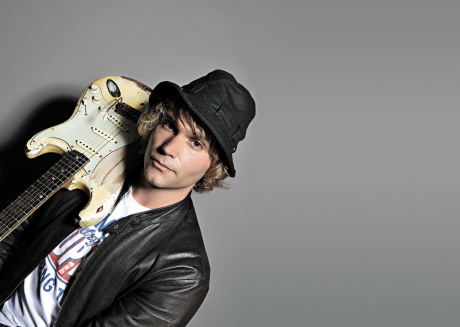
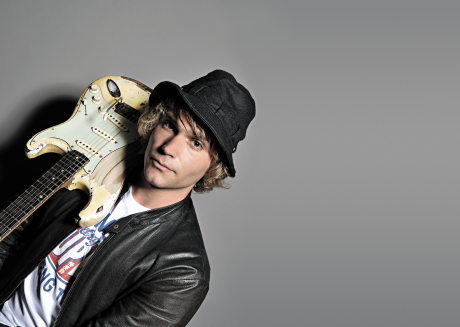
As we open the case on his Strat following a flight from LA, Philip finds a inspection document, indicating the good people of customs and airline security have been in the case. Ever the pragmatist…
"Better your case than your ass, I guess," says Philip. "I just kinda wonder… For what reason do they need to go in here?!"
Tell us about that guitar…
"It's a 1963 Fender Stratocaster and her name is Mother and it's my favourite guitar and I'm very grateful to have it."
Is it stock - any mods?
"Yeah, it's stock, apart from those saddles. I changed out two of them. These ones, I think, were found at the bottom of the ocean. They don't move any more! So I changed out the D and E strings."
Is that a tone thing, using the Graphtech saddles?
Get the MusicRadar Newsletter
Want all the hottest music and gear news, reviews, deals, features and more, direct to your inbox? Sign up here.
"Well with those it's just because those strings were being a little finicky. Y'know, I didn't find that it changed the tone enough for me to be too upset to just change two strings. At a certain volume, particularly…"
And the white over sunburst?
"Well I guess that's what Fender did back in the day, as I'm sure you know, they painted them all sunburst and somebody would call up and say, We need a white one, so they'd just spray white over the sunburst…"
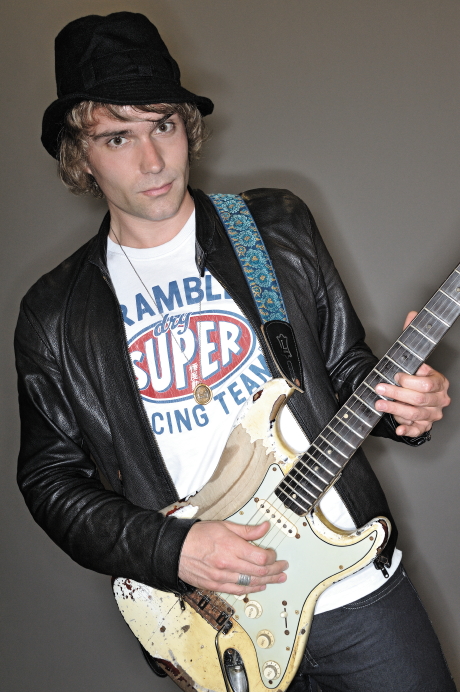
And the other one we've seen you with?
"That's a '62, and it just happened to be white as well. I'm not a racist or anything! That's a rosewood board veneer, late '62, and I set up the same way with the (Dunlop) 6000 fret wire, but strangely enough that '62 sounds more like a '50s maple neck. I don't know why, but it just has a woody twanginess to it that's not shrill…"
Don't they say that on the round-lam boards, the frets actually go into the maple of the neck, which makes them sound more like maple-board guitars?
"It definitely does - there's less rosewood. And on this guitar too, there's not a lot of wood left on here so these are going far into the maple. I think it does make a difference - any slab boards I've played have been a little darker. I think the veneer board is a little brighter, more zing."
Do you think they 'play out'? We've heard people say that if you kick the crap out of a Strat for so long, they start to lose it a bit…
"Old Strats? I think they just get better. Ultimately things wear out and you have to replace parts and stuff. Necks wear out, and (laughs) the body will wear out… [points to the the massive gouge out of the body above the pickguard] I mean that's just straight, 100 per cent bad aim!"
Did the album cover of Live Alive by Stevie Ray affect the colour choice - I know he's a big influence on you…
"Interesting you say that - I always loved that picture, it's such an emotional, beautiful picture of him. In fact there is a guitar of his that I love that's that kind of cream-ish, blonde colour and he plays it on Austin City Limits, later on - it has the tortoiseshell guard on it. It looks so sexy!"
"But how this goes is that both of these guitars came through the same guy in Toronto. My friend Bob, who he's a guy I met when I was 17. I met him through the Buy & Sell - I went to his house to buy an amp and we just hit it off and kept in touch. He knew I was looking for a guitar, and he's got… Well, he's got a '59 flame top, he's a '52 Tele, '54 Strat, he's got millions of dollars into guitars. And he'd call me up every so often and say, Hey Philip, I've got an amazing dot neck 335, you interested?"
"Well how much is it?
"30 grand.
"Hey, next time. I'm saving…
"So anyway, this one came up, he called me and said, Hey, it's an amazing '63. The '62 was actually his. He was like, I'm doing some rennos on my house, and I know you like my '62… Do you want it? And he basically gifted it to me for like a quarter of what it could have been. And I mean it was completely untouched. Never unsoldered, nothing. And the minute I got it… Within six months I had broken the neck… I fucked the thing up pretty bad, but it sounds killer! I must remember: smash the reissues, not the old ones. Hmmm."
It's great to see them being used!
"Well I feel like different things happen when you play them - you're inspired in a different way. I like a lot of the old Tokai's too, they're really cool. They're great frames - you can really work with them, change out the pickups or whatever."
And your main guitars - did you change anything on those, such as the pickups?
"These pickups are all stock. Some of the pots are long gone and I put a resistor on the volume to keep it bright when you roll the volume down, and that sounds killer with the Fuzz Face too. But everything else other than the frets and those two saddles are as it is."
Do you always tune to Eb?
"If it's for my own music, yeah. But if I'm sitting in with somebody else, or when was playing with like Melissa [Etheridge], Jeff Healey and Uncle Kracker, those guys were all A440, so that was standard tuning."
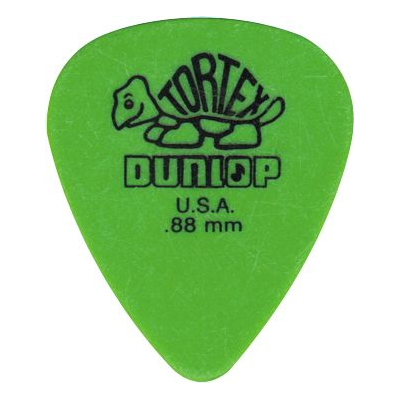
So, philosophically speaking… what plectrums and strings do you use?
"[Laughs] I use the green (Dunlop) Tortex picks, I think they're 0.88mm, and there's another company called Dava picks. They have one that has a nickel end and I love that! Super fast, and they sound great."
"I use D'Addario strings and I can't speak highly enough of them. Gauges, I've been using 11-59 for the longest time, but another thing I've been experimenting with is that Hendrix used nines, and I actually prefer the sound of lighter strings with a Fuzz Face, which is really weird. There's like a slinkiness that just seems to suit me - theirs is definitely a different sound with 0.009s than there is with 0.011s with a Fuzz Face. That's sort of philosophical!"
Don't 0.009s just go like rubber bands at Eb?
"A little bit, and you have to be careful with over bending and so on. But Hendrix tuned down with light strings. That said, I love the tone of the heavier strings. It depends. If you're on the road 250 days a year and you're using 11s or 12s at E and big bends all night… I mean Jeff Healey's one of my favourites and would always do these wicked bends and things, so coming from that place you can get tired and you have to listen to your body."

How do you like your guitars set up?
"I prefer a pretty high action. I actually find it easier to play with a high action - it's a strange thing. You'd think it'd be harder, but it's much easier to get under the string. Sometimes it can go like a sitar where the chords get out of tune because of that and the tall frets - even if you're not pressing hard."
And the truss rod?
"I like it fairly flat with just a little bit of relief in the middle; fairly flat, but it needs a little relief because otherwise when you start to really snap the strings, it can get a bit buzzy off the frets."
"My parents took me to see Eric Clapton when I was little and Mark Knopfler was the second guitar player - it changed my life!"
Let's fill in some biography - how did we get here? You mentioned Texas Flood - was that the defining moment?
"I'm very grateful - my mum and dad always listened to such cool music, and they still do. They're both from the UK; I was born in Wales before we emigrated to Canada. My mum was on the scene in the '60s, I mean she used to tell me how Clapton would show up at parties, sometimes with his guitar. A couple years later he became a megastar of course. All those cool acts. I remember my dad telling me about the day Hey Jude was released and what it was like in the city - everyone was in a trance!
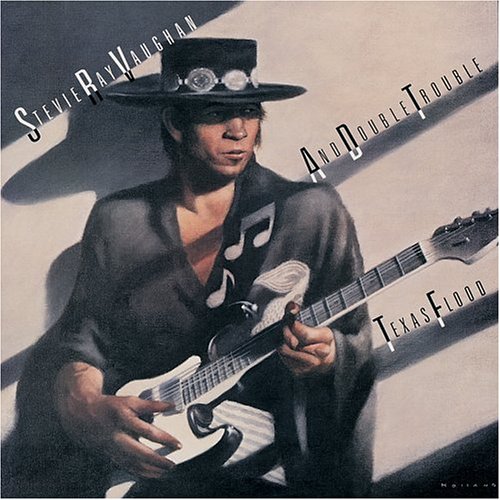
"They had all this great music, like Ry Cooder, The Beatles, Buddy Guy, Stevie Ray… so I gravitated towards that. They took me to see Eric Clapton when I was little and Mark Knopfler was the second guitar player - it changed my life! Less than two years later, Stevie Ray Vaughan was killed and something really shifted in me. I didn't really play guitar at that point.
"I became more aware of the music after [Vaughan was killed in a helicopter crash in 1990]. My mum and dad were both librarians, so he would bring home all the cool music that came in. He had In Step, and I just remember hearing Crossfire with this great guitar solo that was cutting through. I remember my dad saying, This guy's as good as Eric Clapton!
"I was like, What?! Nobody's as good as Eric Clapton! But I used to jump around the house with a tennis racquet and pretend I was playing Couldn't Stand The Weather. I was hip to Stevie, but unfortunately I never got to see him."
Was there a good scene around Toronto?
"Absolutely - a hotbed of musicians around Toronto. There are some badass motherfuckers there, let me tell you. Maybe it's because of the long winters that people stay inside and just get really good… But you can go into any club on just about any night and see someone who will tear your clothes off, they're so good. Jeff Healey had already torn that city up."
"Jeff Healy was a rare guy; very encouraging."
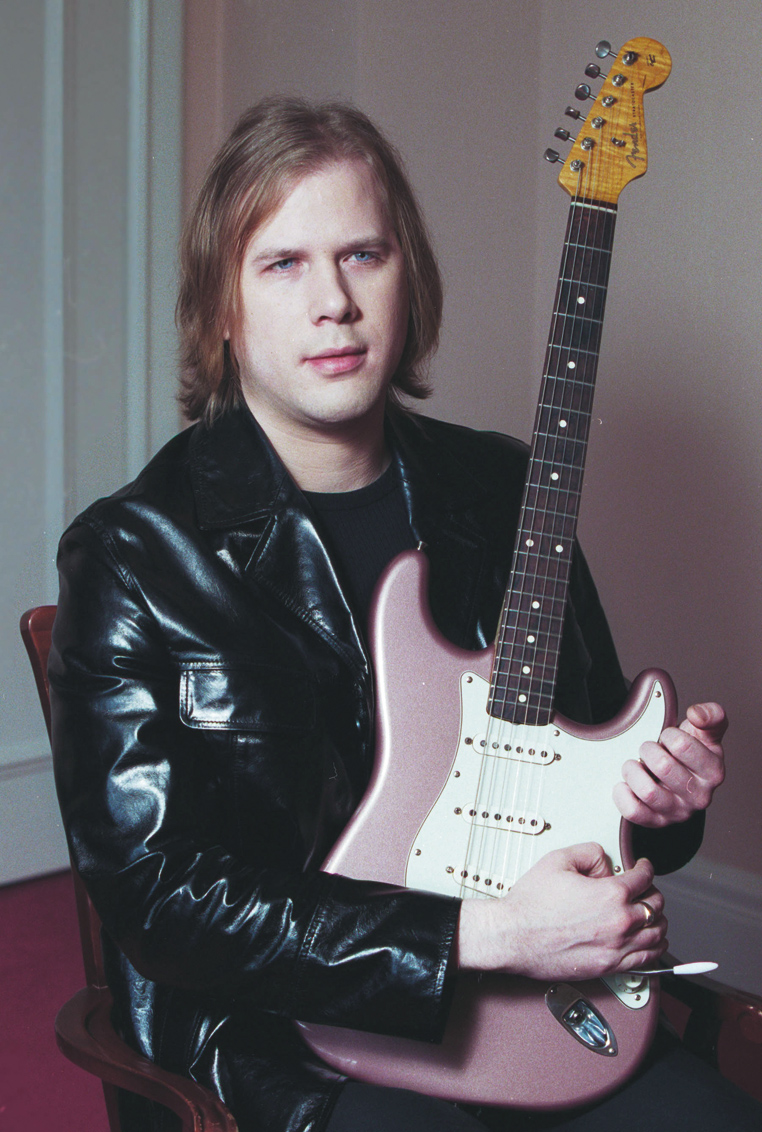
How did you start playing with Jeff?
"Well I'd started playing in clubs, and moving along. A friend of mine named Corey knew Jeff quite well, and I didn't wanted to push it, but Corey told him about me. Then one night I was playing a show, and after everybody in the room was going bananas after every song. I'm like What the hell is going on?! What?! Anyway, it turns out that Jeff Healey was there, so everybody was making extra noise to get excited.
"Then Corey brought me to meet Jeff at one of his jazz gigs where he was playing trumpet and more jazz guitar and stuff. It was a quick hello, I was very nervous. Then one night we were both out and we ran into each other at a club, and we ended up jamming on some songs. We played two songs, got into my manager's car, and he asked if I wanted to play in his band. Blaaaggghhh. Y'know after I barfed, I said yes! I still get watered up about it.
"He said, We'll teach you how to play on big stages, we'll kinda' groom you and we'll help you get going on your own. He was a rare guy; very encouraging. He would say to me stuff like, Hey, take your time - you can stop and smell the roses when you're playing sometimes. I was 19 and I wanted to play everything at once. He said, That's cool, but you can milk it, too. He was helping me."
Was that the main thing you learned from him?
"Well that was one thing. The main thing was that I have a long fuckin' way to go! He was absolutely fearless, he could play anything and everything - totally fearless. It just came through him. It was an honour to experience that and see how far you could go: how much there is to learn."
Did you study or are you self taught?
"Self taught as a guitarist. Pause, play, pause, play… a billion times. I must have killed 100 VCRs and DVD players! And also from seeing great guys in Toronto like Mike MacDonald - you'd want to watch him all night. Another guy, Michael Keith, he could stand with Robben Ford any day. And another guy, Kevin Breit from Sisters Euclid - if you're into guitar and playing, he could be the best in the world. He's crazy good!"
The Hendrix element in your playing - did you come to him second-hand through Stevie Ray Vaughan, or direct?
"I think I might have come to him through Stevie, but I mean I was definitely into Hendrix - how can you play guitar and not be influenced by the language Hendrix wrote? He created a language for the instrument. Anybody that came after him - they're speaking part of his language. I was definitely aware of Jimi, but developed more of an appreciation and connection with Hendrix and his music."
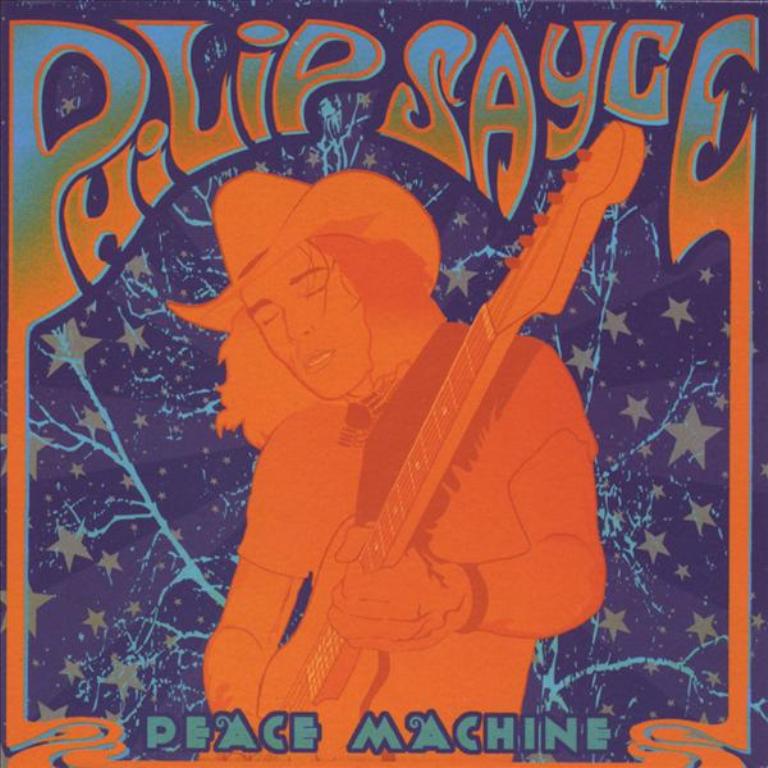
Tell us about Melissa Etheridge - is it right you got involved in her band while trying out an amp?
"I'd moved to Los Angeles with my girlfriend - who's now my wife and we didn't know anybody, which was scary. But an opportunity came up to play with this guy, Uncle Kracker. He came from the Kid Rock camp and was very successful in America. On that tour we kept flying into places and I kept blowing up amps. It was rented backline, say, Twins - I'd run two of them and by the end of the night they'd both be blown up. So I went into Westwood Music in LA, and there was a guy making Mojave amps and they said I should go down there and try them.
"So it's 10 o'clock in the morning, nobody in the store, and it was kinda' like Back To The Future where it's real loud… There's this wall of amps, my Strat and I had a Diaz Square Face… This guy walked in and at first I didn't notice him. And then I notice him walkin' around and before he even introduced himself he came up and was standing quite close… Hmmm, okay… And then he started adjusting the amp as I was playing. Okay… So I said, What's up, man? Nice to meet you…
He said, Hi I'm John, who are you?
"I said, I'm Philip… Who are you?
"He's like, Who do you play with?
"Ah y'know, I do my thing and I play with Uncle Kracker…
"He's like, Uncle Kracker?! Woah. Come to my studio later…
"I had no idea who he was. He handed me his card, it says, A&R,
Atlantic Records. John Shanks? Oh yeah, John Shanks, er, well I don't know who the fuck that is…
"So I walked in, brought this guitar, cos he was very interested in this guitar. And he had, probably 50 guitars… Oh, this one came from Joe Satriani, and this one came from blah blah blah… and I'm mixing Melissa Etheridge's album… He just went off. Here's my Dumbles and all that. I was like, Woah, you've got some shit in here! He was great - we hit it off, a couple of nerds and he's also a very good player. Melissa was looking for a player, so I got a call a couple weeks later and had lunch with her. We hit it off. It was a great opportunity - I mean she's really good - man, she's a good singer. That's not some autotune bullshit."
So how did we get to Philip Sayce, solo artist?
"Well as time was going on, I'd been with Melissa for three years, and man we were busy. But we were able to record something; it was an album called Peace Machine that we did for fun - it was done in a day!
"After that Melissa's like, Well we have to record for an album, and then there's a tour, and then there's the Grammys and shit like that… Oscars, all this great stuff! I was thinking, I have to do it - I'm gonna meet people, it's a stepping stone. And I mean that in a positive way. And she always embraced me in the same way Jeff did. She gave me a ton of space on stage - certain songs she wrote so I could solo! She'd say, I want you to solo for eight minutes! And so I'd just played, so it was like a jazz gig.
"She encouraged me to sing harmony - a great mentor. But after a time it began to feel like a circus show, where I'm in a cage, playing the parts, then the gate comes up and I come out [sings Entrance Of The Gladiators], play all the shit, then I kinda go back in again.
"So I went to her about a year ago and said, I love you, but I have to do my own thing and I have to do it now. And she said, Yeah you do. She gave me a big hug and it's all good."
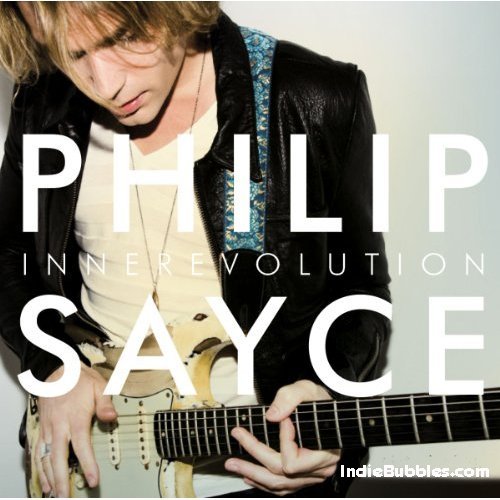
Listening to your records, there's a funky element in your playing, psychedelia and a lot of a soul - is that a fair take?
"Sure, if it resonates in those ways, that's cool. Peace Machine was very much like a one-day thing with a retro twist. But this was more like, let's take some time and focus."
How did you get into singing? You obviously work at it…
"Well it came out of necessity. In high school we had a battle of the bands coming up and our singer quit - I wasn't very good but we got through and we won. Again though, not to go back to it too much, watching Jeff as a singer and a player, and watching Melissa sing. Singing is all about conviction and courage. Who's to say what a good singer is? It's about confidence and projection - like Neil Young is one of my favourite all time singers, and he's a very unique singer."
"All my favourite players, the way they play it sounds like a voice. Knopfler, Clapton… all of these guys have this beautiful vibrato - Albert Collins, Jeff Healey, BB King."
Did you have lessons?
"I did. When I was in Toronto I was singing a lot and we played really loud on stage - not loud for the sake of being obnoxious, but y'know it gets loud. And that's hard on the voice if you don't have great monitors and you over sing. So I went to see a vocal coach in Toronto and starting studying; warm-up, cool down, learning how to project.
"I'd also done some work with a producer who said I could really benefit from some time just honing my voice. So I did, and when I got to LA, I started sitting with this guy, Seth Riggs - he teaches people. He's working with Michael Jackson, with Stevie Wonder… I just started learning some of the technique - some of the weirdest farmyard animal noises!"
Your vibrato - vocally and on guitar - is wild. Did you work on that specifically?
"Even now I work on it and practise it. All my favourite players, the way they play it sounds like a voice. Knopfler, Clapton… all of these guys have this beautiful vibrato - Albert Collins, Jeff Healey, BB King.
"In fact I met BB King once and the first thing I asked him about was his vibrato and he said, Well, I was just listening to a [lap] steel player and I was just trying to emulate them. He showed me with his hand how he did it. So I ran home and I practised it of course. It's so expressive - Stevie, Carlos Santana, Jeff - it's just so beautiful."
It's interesting that you mention Clapton in such high regard. To me you're more on the Albert King / Hendrix / SRV lineage than Freddie King / Clapton…
"I've listened to a lot of Clapton bootlegs and just as somebody who listens to his playing, you can always sing one of his solos. It's like a theme, every time he plays it's like he just composed something beautiful. There are times too when he can cut, and I think it's that inspiration of hearing some of those things. He can play that wicked, edge-type stuff - he can get nasty and it's some off that that really gets me off on his playing."
For the new album, Innerevolution, was there a stock gear setup you began with?
"It was kind of a free-for-all, but there was a main world that it happened in. I was really set on using a [Marshall] '68 Super Bass Plexi that I found in LA. It was purple, and man, it sounds killer. It sounded like a jet plane taking off, I mean absolutely the loudest amp I've ever had. I've had a Marshall Major before, but this thing, man… I was also really excited because of Hendrix/Super Bass thing, and Doyle Bramhall II, too, who was getting some really great sounds using one.
"So I brought this one to the studio… and it blew up immediately. So we took it back, fixed it, brought it back, sounded great, got a song or two out of it… then it blew up again. And every day it blew up, it took a whole day!
"Outside of that, there's a guy in Sweden who makes amps for me - Mystic Amps - And his name's Tommy Cougar. I ended up finding one of his amps in LA and I bought it after three notes. I played it, I was like, this is the amp! We did a few tweaks, sent it back and forth a few times and he voiced it to what I wanted to hear, and we ended up turning it into a signature amplifier. So I have three of those amps now. It's based on a Dumble Steel String Singer, but with some Marshall woodiness in it. It's just really loud and clean with two 6550s in it.
"So we used that with a 2 x 12 closed-back Bassman cabinet with EVs, and I run that in conjunction with a Super Reverb that Cesar Diaz modified for me a few years ago before he passed. There was also a Vibratone that was being powered by a Bassman head that Cesar had also worked on. We had a Vox AC30 in there, oh and a 4 x 12 with four EVs and we'd run various heads through that…"
"With the Fuzz Face, you don't necessarily have to use it full blown out, Foxy Lady-style which is sexy as hell. If you roll the [guitar] volume back, it'll get crystal clean"
You were recording with EVs?!
"Yeah, it's EVs on everything, except the Super - I've gone JBL crazy and put JBLs in my Supers. Anyway, there were around four to six amps that were on. It was fun - it was loud as shit! Really, really loud. Good loud.
"Which answers my next question… In some parts, you'll play a note and even though it's not massively gainy, it'll sustain forever. So given the volume, I guess there's not much need for any compression?
"No, it's just really loud, and then using a Fuzz Face, which is what we were talking about earlier. With the Fuzz Face, you don't necessarily have to use it full blown out, Foxy Lady-style which is sexy as hell. If you roll the [guitar] volume back, it'll get crystal clean, then somewhere in between it's like an overdrive and it'll sustain forever."
Do you have your FuzzFaces modded by anybody?
"No. I have two original '60s ones. One's a silicon one and one's germanium. The silicon one's got a little more teeth, the germanium is a little woollier."
A lot of players find it hard to get a 'good' sound from a fuzz pedal, other than that full-on square-wave noise, yet you make it sound much more rounded, articulate and musical - how?
"Well let's say we were sitting here and there was a Super Reverb and we're using a Strat. With the Fuzz Face, I would put both knobs on full, and even if you weren't playing, it'd be like that ocean sort of sound! So then I'd just roll both back until that hiss goes away, and there it is.
"After that, it's all in what you do with your volume knob; super touch-sensitive. If it starts to get a little frantic sounding, just roll your volume back a touch and it cleans right up.
"If you're in love with the Tube Screamer / Fender amp kinda' sound, it can be a long transition going over… It's almost like learning to play again.. It feels different under your fingers. And that's another thing about exploring Hendrix - just his tonal power and what he did with the fuzz."
Are there humbucker guitars on the record?
"There are, yeah, though most of the humbuckers are for rhythm stuff. Actually, one last minute addition - Tennessee Girl - was recorded with an old '50s Tweed Deluxe, maxed, and a '59."
It's generally a big sounding record; layered guitars, ace production job - how do you get close to that in a live environment?
"Just play louder [laughs]. No, well, we recorded everything to two-inch tape, so it's a very analogue-y type record; old gear. And that was the idea, just make it fat and warm. Jay Rustin, who produced it, he's Canadian and I met him in LA. He's a brilliant up and coming engineer/mixer/producer. He did the Steel Panther record, which is a very different sounding album - he's a genius."
What about Take You Away? It has an almost Queens Of The Stone Age grunginess about the riff…
"That was a lot of Strat and Fuzz Face, and I think we doubled [the riff] with a little bit of Les Paul underneath it. The solo is a Strat. I wanted that song to sound very pissed off. I was raised in Catholic School in Canada and had a really inappropriate relationship with a high school teacher for three years - she's fuckin' nuts - and that song is about that. That is very much an outlet for that.
"But I'm also a sucker for the pretty things, the nice chord changes, and with this album, when I delivered it to the label, they loved it. But they still wanted to hear a couple more bluesy tracks, so we changed a couple songs in the end, and took off a couple more of the singer-songwriter type songs; more poppy. At first, I was like, Really?! Because I'd written one of the songs with Richard Marx who's a good friend, an incredible writer. We approached it in a real vintage, retro kinda' way so it wasn't sappy. A really cool song. But we skewed it more in the blues direction.
"Before that, I was working with a manager who was saying I shouldn't play so much guitar in my music. He said, We should hide the guitar - just stand there and look good. Really?! So I went a wrote a bunch of candy-ass pop songs, and he wanted me to spin more like that. But I realised that I wanted to rock out, maybe you're not the right guy… that was a bit of a mindfuck.
"On one of the songs, my friend Cliff who played keyboards - in fact he should be knighted. He played with Queen, with Elton John. Well, back the eighties, Elton gave him a Steinberger, y'know the one with no headstock. He brought it in, and we all laughed at it 'cos it looks ridiculous, but then we played it and it sounded amazing, so we ended up using it on a whole bunch of rhythm stuff!
"I also have an SG that a love; a mid-'60s one with a single P-90."
Changes - the opening song. Is that an octaver on the main riff, or did you double it?
"That's just the Strat with the Fuzz Face. I played it once, and Jay said, hey, you got anything else you can double it with? So we doubled it with an Octavia."
The intro to Scars - some kind of envelope filter?
"Yeah, it's actually a Mu-Tron-type thing, There's a wah-wah too. I have some great stuff from Xotic effects, and also an old DOD thing kicking around for those kinds of sounds. I wrote that song with Richard Marx. He says, So whatcha' got? What's the last riff you wrote? I played it, he says, Awesome… We wrote it in 15 minutes."
And the Lenny Kravitz / Always On The Run comparison is inevitable…
"Well I loved Lenny Kravitz, especially the first three albums. I'm not afraid of a comparison, I think of it more as a compliment."
Likewise Little Miss America - it's hard to record a Uni-Vibe-y kinda' thing and not get compared directly to Hendrix…
"Full on. When I think about how much Hendrix's music moves me, same with Lenny Kravitz, if I create something that mirrors a bit of that and people pick up on it, that's a massive compliment. Somebody might say, Well why don't you do your own thing, or make your own sound? Well I do, but in that moment, I'm feeling a certain way about it. If you want to be The Cool Police you can, but those are the choices I made in that moment. And [Little Miss America] is kind of an homage to Hendrix's funkier, Band Of Gypsies stuff.
"The song itself is kind of a social comment on some of my personal - I mean I didn't want to make it too obvious - but the way I disagree with some of the things I see happening in America, just as a social mindset."
Such as?
"Just an incredible amount of self-centeredness. And I here I am talking about myself for two hours, but I work hard at trying to be aware of other people. But I think there's an illness happening that people are not aware that the world is a big place. It's not a diss, just a comment and a feeling."
Celebrity, or general populous?
"I think it's there at both levels. But that's part of the illness in a way because we talk about them as two different kinds of people, but it's the same thing. We're losing touch with the fact that because somebody is really famous, or they work at the 7-Eleven… We're all the same thing. We shouldn't lose sight of that."
And is it a Uni-Vibe?
"Yeah, so getting back to the important stuff… [laughs]"
By the way, what strings do you use?
"Sure, forget the guy at the 7-Eleven [more laughter]. Well, it's a pedal made by KR Musical Products, the Megavibe. My favourite was by Bob Sweet at Sweet Sound. He passed away, but I have an old one that he made for me that's broken, and I don't know who to take it to to fix it."
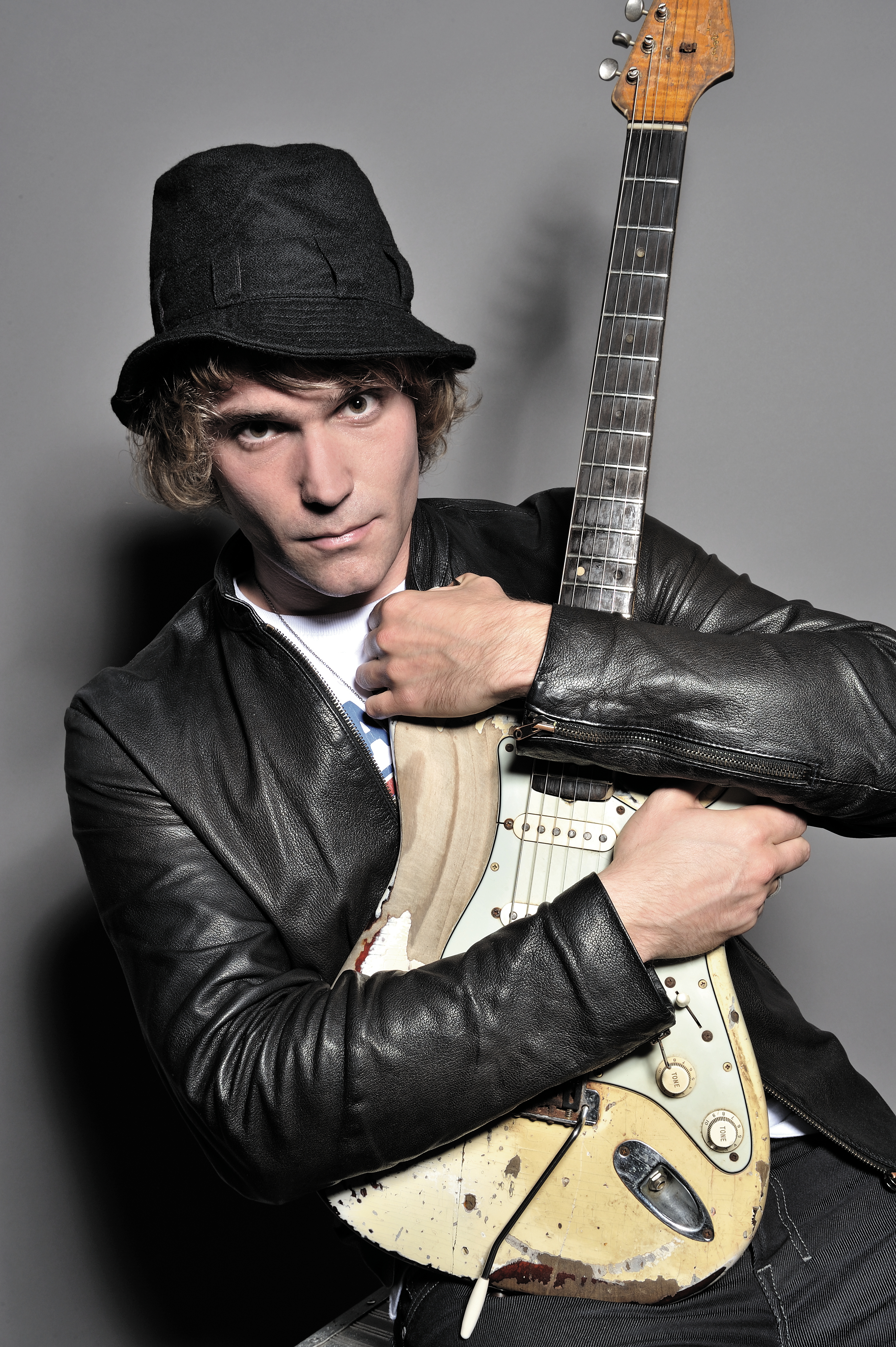
Delay is a big part of your sound too…
"I have an old Echoplex I like to use, an EP-3. I love the sound of it. Unfortunately it doesn't travel well so I use a Line 6 DL-4 on the road. It sounds okay live, but nothing's going to sound like a tape, with the warble and all that."
"I think the UK and Europe is really responsible for this blues boom right now."
How else does your live rig differ?
"Well on this tour - we're not playing arenas yet, and I'd love to - I'm not bringing all the amps. I have a [Fender] Super Reverb, one of my Mystic Mother heads and the way the two work together is really cool, running both at the same time. I don't run 'em on 10, but I get going to that place, like six-ish - you know that sound, starting to give you a little bit, then just add the pedals. I put plexiglass in front of them - those JBLs are loud. And EVs project, man. When the stage is at head level…
"I also brought my [Fender] Vibratone over and Tommy just sold me this'80s Mesa Boogie MkII which he's modded the shit out of. It has some custom mods and tricks, and I'm using that to power the Vibratone."
And what's on the pedalboard?
"It's gonna be an old Vox wah, like the Clyde, a Fuzz Face, an Octavia, a Diaz Square Face, Klon Centaur and a TS-808. I'll choose one or the other, and a Boss TU-2. I also have a Keeley looper which keeps the Boss and Tube Screamer out of the line because they're not true-bypass - that messes with the Fuzz Face. Also a Diaz Tremolo pedal. That's it. No racks or anything."
So blues rock seems pretty healthy at the moment - there are lots of good guitar players coming through…
"I think the UK and Europe is really responsible for this blues boom right now. Look at how well Joe [Bonamassa] is doing over here. And deservedly so, he's awesome! There's a lot of great players coming through."
And what's next for Philip Sayce. What's the big hope?
"Well, it's very different staying at the Ritz Four Seasons than it is the Travelodge Marylebone, but you either fly the nest or you stay there. And while I'm very grateful to play with those bigger artists and learn from it, I was always kinda' sad that I wasn't doing my own thing.
"So the big hope is that I can keep creating the music that's in my heart and that might inspire people to do something that's important in their own lives: whatever's important to them. That's what we're here for, right?"
Phillip Sayce plays the following dates on his November UK tour:
7 - Academy, Manchester
8 - Robin, Wolverhampton
9 - Rescue Rooms, Nottingham
11 - O2 ABC 2, Glasgow
12 - Caves, Edinburgh
13 - O2 Academy2, Newcastle
15 - O2 Academy2, Liverpool
16 - Mr Kyps, Poole
17 - Borderline, London
More info: www.philipsayce.com
Guitarist is the longest established UK guitar magazine, offering gear reviews, artist interviews, techniques lessons and loads more, in print, on tablet and on smartphones Digital: http://bit.ly/GuitaristiOS If you love guitars, you'll love Guitarist. Find us in print, on Newsstand for iPad, iPhone and other digital readers
“Every note counts and fits perfectly”: Kirk Hammett names his best Metallica solo – and no, it’s not One or Master Of Puppets
“I can write anything... Just tell me what you want. You want death metal in C? Okay, here it is. A little country and western? Reggae, blues, whatever”: Yngwie Malmsteen on classical epiphanies, modern art and why he embraces the cliff edge












